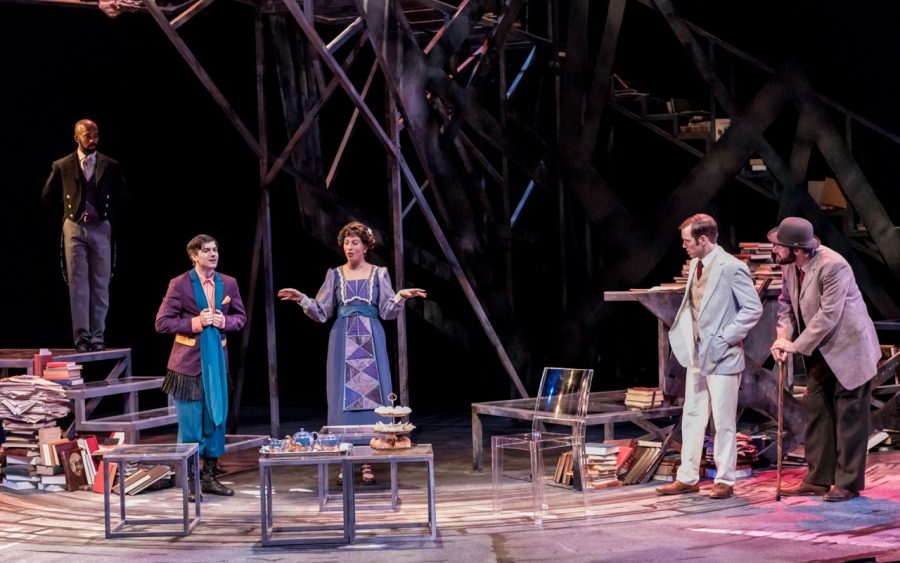‘Travesties’ creates whimsical onstage chaos for the 21st century student
Photo Courtesy of Darrell Hoemann/Illinois Theatre
Tristan Tzara played by Kevin Blair, Gwendolyn played by Jessica Kadish, Henry Carr played by Christopher Sheard and James Joyce played by Mark Tyler Miller during a rehearsal of the Travesties in the Colwell Playhouse at Krannert Cener in Urbana at the Virginia Theatre on Tuesday, Oct. 17, 2017.
October 28, 2017
Wearing a purple coat and teal pants, Tristan Tzara hopped about the stage erratically, reading a scramble of words he pulled out of his hat.
Meanwhile, James Joyce began his own equally nonsensical recitation of limericks, and Vladimir Lenin had an animated conversation — in Russian — with his wife. Above the chaos sat Henry Carr, an old man in a red robe.
Such is the beginning of “Travesties,” the play mocking a comedy of manners. First produced in 1974, it is centered around Carr and his tales of life with historical figures Joyce, Tzara and Lenin in 1917 Zurich.
The play runs from Oct. 19 to Oct. 29 at the Krannert Center for the Performing Arts.
Kevin Blair, senior in FAA who plays the role of Tzara, has been acting since the first grade.
Get The Daily Illini in your inbox!
“This play is probably the smartest play I’ve ever been in, just in terms of the words they use, the ideas that the characters have and the opinions the playwright has put into the play and the opinions the characters have,” Blair said.
The role of Tzara is based on one of the real-life founders of Dadaism, an anti-art, anti-bourgeoisie, rebellious, artistic movement that took place during the early 20th century. One aspect of Dadaism was rejecting social and artistic norms and embracing the “seemingly ridiculous.”
Blair said the character’s quirkiness was one of the things that drew him to the role.
“This role, I thought, would be a lot of fun to play because Tristan Tzara is just so crazy and so chaotic,” Blair said. “There’s no limitations to what he could do or how he could react.”
The play’s nature gave him the freedom to be creative and “wild” with his portrayal of Tzara, Blair said. He said the play itself is based on one character’s imagination.
In the play, Blair said it is hard to tell what is real and what is not because it takes place in Carr’s memories.
However, he said one of the most difficult aspects of the performance was to make the dialogue understandable to the audience.
“The vocab is extreme, so bringing that to life has been the most difficult part because we need to not only understand what we’re saying, but we need to get the point across to the audience,” Blair said. “We need to make sure they’re understanding what we’re saying.”
Laura Hackman is the guest director for the play.
She said the play’s intellectual content and historical references were a challenge to work with. It meant the artistic staff had to spend time with the cast ensuring they understood the show.
“It also meant that some of the audience would be unfamiliar with many of the allusions, and it felt like a challenge to keep those audience members involved,” Hackman said. “We approached it in much the same way one approaches a Shakespeare play, doing more than a week of table work, during which we read the script and stop to discuss all questions anyone had.”
Hackman arrived on the scene after the cast had already been chosen, but both she and Blair said the cast and crew worked well together.
Blair said working with Hackman, and guest actor, Christopher Sheard, who plays Carr, was one of the highlights.
Although the play is set 100 years ago, Hackman believes it is relevant to the world today.
She wrote in the play’s program that Joyce, Tzara and Lenin are all ways to combine the different philosophies into one critique of the world. She suggested the dialogue between these characters can be relevant to today’s political climate.
“A question like, ‘What is the role of the artist in politics?’ is not so very different from, ‘What is the role of the athlete in politics,'” Hackman said. “The question of whether people who have a public platform have a right to use their spotlight to comment on society and politics, or should these public figures be confined to simply entertaining us with their skill.”
Gina Gonnella, senior in LAS, said she really enjoyed the play and that the events that happened in the Russian Revolution are still relevant today.
“The xenophobia still applies, too,” Gonnella said.
Blair hoped the audience enjoyed the play, but he wants the audience to end up questioning the world they live in.
“What the play does is it makes people want to have opinions,” Blair said. “I think that’s really relevant to today because of where we are politically. I think it’s really important that people start to form opinions and have opinions about whatever it may be.”







